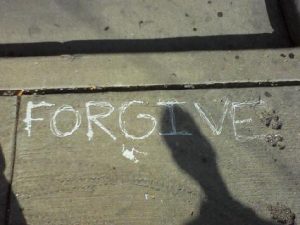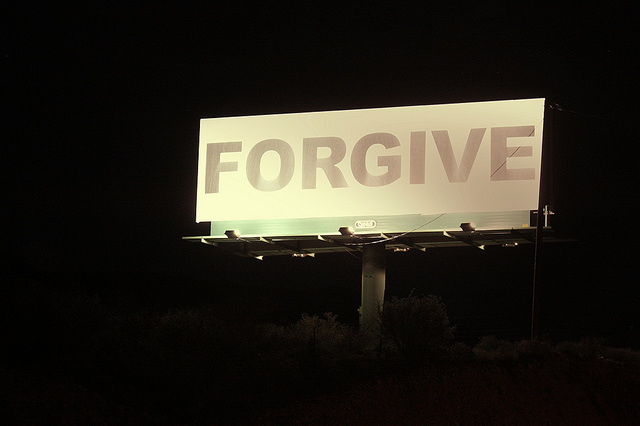Revised Common Lectionary Reflection for the Fifteenth Sunday after Pentecost, Proper 19, Year A
September 17, 2017
Lessons: Genesis 50:15-21, Alternate: Exodus 14:19-31, Psalm 103:(1-7), 8-13, Romans 14:1-12, Matthew 18:21-35
Theme: God’s faithful and generous people respond to God’s radical mercy and forgiveness by forgiving others with the same lavish spirit.
Key Scripture: At that point Peter got up the nerve to ask, “Master, how many times do I forgive a brother or sister who hurts me? Seven?” Jesus replied, “Seven! Hardly. Try seventy times seven. Matthew 18:21-22 (The Message)
Preaching/Teaching Reflection
Last week’s gospel dealt with the proper way to resolve conflict. This week, we tackle the thorny topic of forgiveness. Once again, Peter leads the way into discussion with his question about the number of times one should forgive another member of the beloved community who sins against him. He offers what seems like a generous enough suggestion of seven times, a meaningful and  complete number that surely exceeds any expectation.
complete number that surely exceeds any expectation.
However, Peter is asking Jesus, and Jesus’ divine economics are quite a different thing altogether. Jesus ups the ante to seventy times seven and launches into a parable to illustrate his point. It’s a story about a rich slaveholder who sets out to settle accounts and shows radical mercy and forgiveness to a poor wretch who owes him an exorbitant amount. You would think with this burden of debt lifted, the forgiven slave would in turn show mercy to others. But that is not the case, and at the end of the story the slave is in thrown into prison for not showing the same forgiveness to others. Jesus also issues a stern warning about how God will treat those who are stingy with forgiveness in real life.
Brothers and sisters, why is it so difficult for us to offer forgiveness? Of course, the answer is firmly rooted in our faulty, fallen human nature. Left to our own devices we will make a mess of things. We will default to care of “number one” at the expense of our neighbors, and we will hang on to a grudge like a tick on a dog.
Put simply, forgiveness is difficult to practice. Whether from a wounding comment or physical violence, hurt and pain are tough to let go of. In fact, the dictionary definition of forgive is just that: to stop feeling angry or resentful toward (someone) for an offense, flaw, or mistake, or to cancel a debt.
Forgiving someone does not mean absolving them of the action or the guilt; that’s God’s work. To forgive is rather to set ourselves free from bondage to offense by letting go of feelings and emotions that haunt and imprison.
Are some offenses more difficult than others to forgive? Absolutely! Some offenses can scar and alter a person’s life forever, and there will be people in our communities who have and continue to suffer greatly because of the actions of others. Abuse and violence cannot be brushed away, should not be covered up, and certainly should not be couched in a bad theological interpretation of this passage. Jesus doesn’t say anything about forgetting or ignoring an offense, or for opening up yourself for more pain.
Still, this forgiveness work is tough stuff and a tall order. It may take 77 attempts at forgiveness to finally let the hurt and anger and pain go. Like so much of the discipleship life, forgiveness seems to be more a process and less a destination. Sure, we Christians know our ultimate destination. It’s the living into and getting there that’s tough because it involves negotiating the already and not yet of life.
We see this played out in many ways: church council members holding grudges, kitchen committees at war, or altar guild members in a snit. Even the Hatfields and McCoys forgot they were fighting over a pig.
Conversely, we do see radical examples of forgiveness in practice: the Amish community following the tragic Nickel Mines school shooting, the families of those slain at Mother Emanuel AME  Church in Charleston, South Carolina, and Sister Helen Prejean midwifing forgiveness on death row. Most of us fall somewhere in between when it comes to practicing forgiveness.
Church in Charleston, South Carolina, and Sister Helen Prejean midwifing forgiveness on death row. Most of us fall somewhere in between when it comes to practicing forgiveness.
God is merciful and just even as we bicker and squabble and try to let go. As the poet William Langland said centuries ago “All the wickedness in the world that man might do or say was no more to the mercy of God than a live coal dropped in the sea.” We humans aren’t there because we aren’t God. We just keep practicing until we get it right, until we are freed from our own prisons of jealousy, hatred, doubt, fear, and anger.
So how many times are we to forgive our sister or brother? Don’t count. Don’t ask. Just practice forgiveness, relying fully on God’s grace to sustain you and trusting that whatever and whomever you need to forgive, God will give you what you need to move on toward wholeness and hope.
In Worship
Forgiveness isn’t always easy. In fact, sometimes grudges are borne for years – even to the grave. Jesus tells us to forgive our brothers and sisters from our heart. How is this possible when our hearts are so often hard and unyielding and our hurt and pain so debilitating? How do we make this happen when our minds seem to prevent us from living out this divine command?
Invite each worshiper to take a small heart-shaped wooden token or smooth stone with a heart drawn on it with a sharpie or paint. Remind them that forgiveness isn’t easy, but it’s about laying down the hurt, anger, and pain with the help of the Holy Spirit. It doesn’t always involve forgetting, and it’s surely not about being a doormat. It’s really more about a change happening in our own lives and hearts. Tell the worshipers to assign to this token a hurt involving someone else that they need to let go of. There is no time limit; the letting go can happen during worship or it may take weeks, months, even years. Invite them, when they are ready and able, to bring the token and place it in a basket by the font or at the foot of a cross. Forgiveness, like faith, is part of the discipleship journey. It’s more process than destination. Offer a simple prayer for help with forgiving, and make sure that you take part in the project, too.
With Youth
Are vegetarians really weaker than omnivores? What in the world is Paul talking about in this week’s epistle lesson? Youth are all too well acquainted with being judged at school, in sports, or even with family members. Invite them to process what it feels like to be judged. Virtually all will report it to be an uncomfortable or unpleasant experience. Paul reminds us that “If we live, we live to the Lord, and if we die, we die to the Lord; so then, whether we live or whether we die, we are the Lord’s.” Our worth is not defined in how others judge us, but rather in the simple fact that we belong to God. Whether you’re fond of bacon or kale, indie rock or country, baseball or lacrosse, your worth comes from your status as God’s child — not your appetite, your clothes, or the car you drive. This completely countercultural idea reflects the foolishness of the cross – but it’s absolutely real and true for the Christian. Invite youth to explore this reality and also how they might extend this same grace to others. Be prepared for the conversation to take some strange twists and turns but do trust the Spirit to give you guidance and support.
With Children
Does God Keep Score? We live in a world where keeping score is important. We keep score to know who wins a game. We keep “score” to make sure we are getting our fair share. We keep score to know how we are mastering learning goals and objectives in school. And we tend to keep score when we’ve been wronged or hurt, too. Thankfully, Jesus doesn’t keep score when we mess up. He forgives us and loves us. Peter asks Jesus how many times he ought to forgive a fellow church member, suggesting seven times as a generous number. Jesus says seventy seven times — in other words a lot — as many times as it takes to make things right. Whew! That’s good news and hard work at the same time. Forgiveness is something we have to practice just as we would a musical instrument or a sport. We have to keep at it. The more one forgives, the more our heart grows in its ability to forgive. Thankfully, God isn’t a sinner’s scorekeeper, but that does not mean we stop practicing forgiving others. We keep at it, working day by day by day. “I forgive you.” These are very important words. They feel good to hear, and if you work at it, they can feel good to say. Finish with a prayer for strength to keep practicing forgiveness.
Weekly Stewardship Bulletin Insert
What does forgiveness have to do with stewardship? Quite a lot when you consider that we are to be good stewards not only of resources and time but also of relationships and one another! Practicing forgiveness is also healthy for the one who needs to offer forgiveness. Doing so can reduce stress and improve overall wellbeing. Who or what do you need to forgive in order to be a better steward of God’s abundant grace, mercy, and love?
Stewardship at Home
You’ve probably heard the term “Fake it until you make it.” Sometimes that may be what we have to do with forgiveness in order to let go of a hurt or wrong. It is, however, important to be honest about how the wrongdoing has affected you. Only though honesty in love can the healing, letting go, and transformation of forgiveness truly take root and grow in your life.
This week take some time to consider who and/or what you need to forgive. Write a note or letter to the person or persons—preferably handwritten. After you have written and extended a message of your forgiveness, put it in an envelope and spend some time praying over it. Do not send it to the intended recipient immediately. If, after the week is over, you still do not feel that you are able to send it (or perhaps you cannot send it if the person is deceased or unable to be contacted), either put it away for a longer period of time or tear it up and start over when you feel that you may be ready. Remember that forgiveness is process, and working through the process can definitely lead you to a better place of healing and wholeness, even if the wrong is not one that should be forgotten or absolved. Trust the Holy Spirit to guide you, and be gentle with yourself if the wrong you are addressing is a grievous one.
Photos: timlewisnm, mobilesage, and Aaron Myszka, Creative Commons. Thanks!
Note: Reprint rights granted to congregations and other church organizations for local, nonprofit use. Just include this note: “Copyright (c) 2017, Rev. Sharron Blezard. Used by Permission.” Other uses, please inquire: thewritelife@hotmail.com.




Leave a Reply